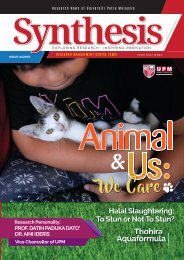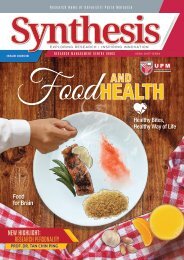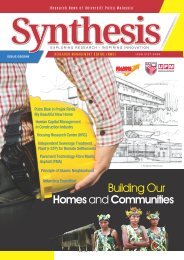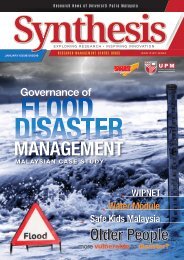SYNTHESIS 1/2020: CLIMATE CHANGE & DISEASE SHIFT IN MALAYSIA
Biomedical and health sciences research has always been the centre of focus in many countries for centuries. In fact, a portion of the tax-money has been allocated to research and development (R&D) in the country to improve the health and well-being of the people. The importance of R&D can be seen with the recent pandemic of COVID-19, which has swept the world with fear of the disease. Many parties are working together to curb the outbreak; healthcare providers nursing and treating the patients, scientists developing the virus detection system and vaccines, engineers creating tools for temperature detection and surface sanitising machine, and many more. All this expertise and creativity come from years of experience and hard work in R&D to create a better future for the nation and mankind.
Biomedical and health sciences research has always been the centre of focus in many countries for centuries. In fact, a portion of the tax-money has been allocated to research and development (R&D) in the country to improve the health and well-being of the people. The importance of R&D can be seen with the recent pandemic of COVID-19, which has swept the world with fear of the disease. Many parties are working together to curb the outbreak; healthcare providers nursing and treating the patients, scientists developing the virus detection system and vaccines, engineers creating tools for temperature detection and surface sanitising machine, and many more. All this expertise and creativity come from years of experience and hard work in R&D to create a better future for the nation and mankind.
You also want an ePaper? Increase the reach of your titles
YUMPU automatically turns print PDFs into web optimized ePapers that Google loves.
Research Highlight
Malaysia One Health
University Network
(MyOHUN)
Malaysia One Health University Network (MyOHUN) was initiated
in 2011 as part of the Southeast Asia One Health University
Network (SEAOHUN) to promote the philosophy and spirit
of One Health in working together to respond to new and
emerging diseases. Under the Emerging Pandemic Threat
and One Health Workforce (OHW) (2013-2019) project,
MyOHUN is tasked to improve human capacity to detect,
respond, and prevent the threat of infectious diseases in
Malaysia through education and training of students and inservice
officers. The United States Agency for International
Development’s (USAID) Emerging Pandemic Threat (EPT)
program has been funding the aforementioned projects and
will continue to provide funds for OHW-NG (Next Generation)
from 2020 till 2024. The secretariat of MyOHUN, which is
the National Coordinating Office, is located in the Faculty
of Veterinary Medicine, Universiti Putra Malaysia. MyOHUN
was chaired by Prof. Dato’ Dr. Mohd Hair Bejo (2013-2019)
and is currently chaired by Prof. Dr. Abdul Rahman Omar,
whilst the National Coordinating Office is headed by Prof.
Dr. Latiffah Hassan, who is also the Coordinator of MyOHUN
(2013-current).
One Health is a concept and approach that helps people
understand and address health challenges arising from
the fact that people, animals, and our environment are
inextricably linked and that a threat to one poses a threat
to all. Through the philosophy of One Health, MyOHUN’s
transdisciplinary training approach instils and nurtures the skill
of collaboration and partnership amongst people of different
backgrounds. Collaborations between member universities,
ministries, government agencies, and communities create
synergies that allow MyOHUN to develop and execute
some of the most unique training activities among member
universities and ministries. These trainings are all targeted
to the vision and mission of MyOHUN which is to create a
network of social and intellectual excellence on One Health
against infectious and zoonotic diseases of national and
global concern as well as to link and enables universities,
government, and relevant agencies to generate social and
intellectual capital on One Health against infectious and
zoonotic diseases.
MyOHUN has formulated and executed more than 90
national-level training since 2013. Our workforce pool
has reached more than 2300 among ministerial officers,
academicians, researchers, and students from multiple
disciplines and fields. Some of our most creatively
designed training includes field simulations, tabletop
exercises, national workshops, seminars, and forums and
field-based SCL activities.
MyOHUN strives to maintain mainstream and current to
the most updated global health concerns and issues. For
example, since 2016, MyOHUN has been actively involved
in national efforts to provide training platforms that
improve awareness and understanding of antimicrobial
resistance (AMR) in both animals and human health locally
and regionally. Moreover, in the face of emerging zoonotic
disease events, MyOHUN has actively collaborated with
the ministries to organise annual field exercises and
simulations for diseases such as avian influenza and rabies.
These field activities have incorporated academicians
from UPM and other universities as observers (or actors),
which led to an added dimension of learning among the
academicians that have been brought into their classroom
to benefit students. MyOHUN’s training on One Health
for the future workforce includes exciting interdisciplinary
training programs for postgraduate education on
experiential field learning and table-top exercise for
disease outbreaks, undergraduate community extension
education for marginalised communities, ecosystem
health, In-Situ problem-based learning, and One Health
young leader and communicator. These student-level
training programmes situate young individuals from
multiple universities and of various backgrounds to enable
them to work together for a common objective.
8 | ISSUE 01/2020










